AFL 2022: Luke Beveridge expects Bailey Smith to return to club in prime condition despite drama
Having given Bulldogs star Bailey Smith ample time and space, coach Luke Beveridge has put his cards on the table on how things will play out later in the week.
AFL
Don't miss out on the headlines from AFL. Followed categories will be added to My News.
Western Bulldogs star Bailey Smith is set to return to the club on Friday as he awaits the outcome of the AFL’s integrity unit investigation into his self-confessed illicit drugs use.
Bulldogs coach Luke Beveridge said on Wednesday he had not spoken to the 21-year-old since he was interviewed about his behaviour in the 2021 off-season by the league on Tuesday, preferring to give him “space and some peace”.
Beveridge said he hoped Smith and the club would find out the outcome of the league’s investigation “soon rather than later”.
Watch every blockbuster AFL match this weekend Live & Ad-Break Free In-Play on Kayo. New to Kayo? Try 14-Days Free Now >
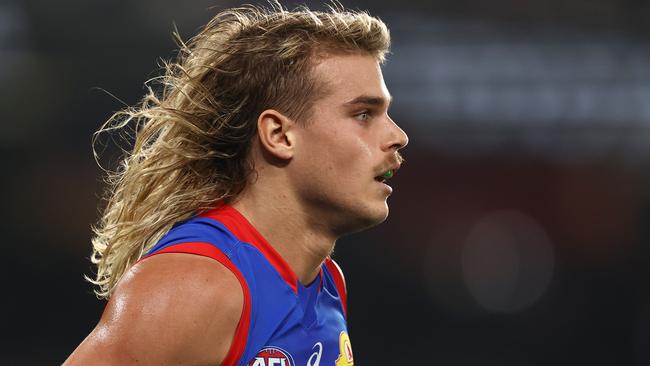
Smith confessed to “indulging in behaviours in late 2021 of which I am deeply ashamed” after video and pictures of him engaging in drug use emerged.
“The uncertainty of the outcome I think is still quite raw. Baz will come in Friday and get going again but obviously we are waiting for the AFL’s ruling on that,” Beveridge said at Whitten Oval.
“The uncertainty hopefully doesn’t last too long and we hear sooner rather than later.
“The first time he will be back in on Friday and we will work from there.
“I haven’t spoken to him, I am just giving him his space and some peace.
“But I couldn’t tell you how it went because it is obviously pretty sensitive and the AFL have got to make a concerted decision that is best for everyone really, for the game as much as Bailey and the future.”
Smith is currently serving a two-match ban for head-butting Geelong’s Zach Tuohy and a potential AFL penalty over his off-field actions would extend his time on the sidelines.
Beveridge said he had no concerns about what shape Smith would come back in whenever he was next clear to play.
“Based on history, Bailey values his football future too much as part of his identity,” the Dogs’ premiership coach said.
“So he definitely won’t let himself go. We are in constant communication with him on what he can do away from the club.
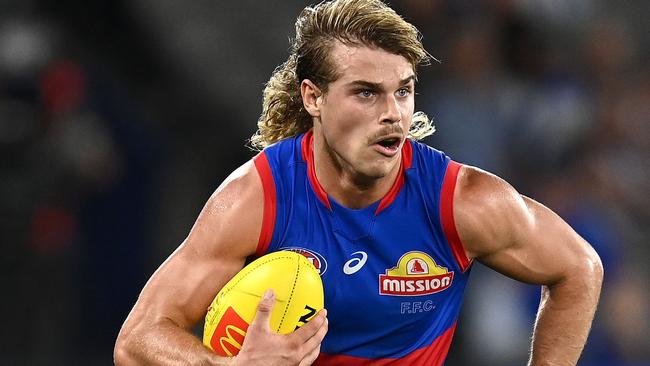
“He will be fine. As we know he has got to serve the two-week suspension (for head-butting) as it is.
“I have no doubt that by the time that Bailey is available to play, whatever happens from this current adjudication, that he will be fit and ready to go.”
But Beveridge did not want to comment on whether he felt an AFL suspension over Smith’s off-field actions was warranted.
“It’s a bit like whether it’s a charge coming out of the game, it’s an MRP type issue,” he said.
“I don’t think us as coaches are ever in a position to really speculate on what we think the outcome should be, so I would rather not comment on that.”
As the 10th-placed Bulldogs face a clash against Greater Western Sydney on Saturday night, Beveridge was not concerned the focus on Smith would impact the rest of the playing group.
“I am not worried about that,” Beveridge said.
“I believe that we’re galvanised and from a cultural point of view there is a lot of spirit and I believe if anything it will probably got the other way.”
“I am not concerned about it.”
Why AFL should bring back ‘three strikes’ drugs policy
The architect of the league’s first illicit drugs policy says the best way to reduce harmful drug taking in the AFL would be to reinstate a three-strikes framework.
In a fierce defence of the league’s regulations, former AFL doctor Harry Unglik told the Herald Sun the league never covered up a player who hit three strikes during the life of that policy.
The three-strikes policy introduced in 2005 was updated to two strikes in 2016 and while players with a second strike are to be suspended for four matches no player has reached that threshold.
Unglik said the illicit drugs policy changed player behaviours and funnelled players with dangerous drug habits into a medical model with rigorous drug testing that saved lives.
Unglik served as the AFL’s chief medical doctor for 16 years and the North Melbourne club doctor between 1983-2001 during two premierships and is now a Roos board member.

He said the AFL’s medical model which guards players with mental health issues was significantly misunderstood, adamant players in that program were repeatedly drug tested to ensure they rectified their issues.
“The reason it was brought in in the first place was WADA didn’t have a policy for out-of-competition testing for illicit drugs like cocaine and ecstasy and marijuana and we felt the emerging fashion with young people was to drink less alcohol and take more drugs so we thought it was a good idea to bring in a policy of harm minimisation,” he said.
“The whole purpose was not to blame and shame but to support and help kids. If you picked up a kid with drugs in the community you wouldn’t put his name in the newspaper, you would put him in a program and help him so that was the aim and it was why it was a three-strikes policy.
“Unfortunately a lot of pressure was put on myself and (fellow AFL medical expert) Peter Harcourt to make it a two-strikes policy and to make it a bit more punitive. I didn’t aspire to it or agree to it, but (under the medical model) we put people into programs, we gave them psychological help and counselling and the one thing no one seems to mention is we used to test them much more rigorously. We were able to help a lot of kids who might have gone down the wrong path.”

The Herald Sun reported on Sunday Smith would concede his cocaine use in October ahead of an AFL penalty for “conduct unbecoming” that could be two weeks.
Former St Kilda coach Grant Thomas said on Tuesday “probably 90 per cent” of players had tried illicit drugs and called on the league to abandon the policy.
Unglik left the AFL in 2017 as the league’s two-strikes policy saw players with a second strike fined, outed and suspended for four weeks.
Asked what he would do under an official review of the policy, he said: “My opening statement was this is all about harm minimisation. So they should go back to three strikes, not two strikes. This is Harry Unglik speaking, not Harry Unglik, ex-AFL medical commissioner. I can’t come at the fact we name, shame and blame kids who are 18 or 19 or 20, kids who make mistakes.
“I put my hand on my heart with the three strikes policy. Even with those guys in the medical program, not one of them went on to get a third strike. It was working because we scrutinised them so much more.”
Said Thomas on Tuesday to 3AW: “I would suggest probably 90 per cent of AFL players that are contracted have tried an illicit drug, so let’s not be shock and horror about this,” he said
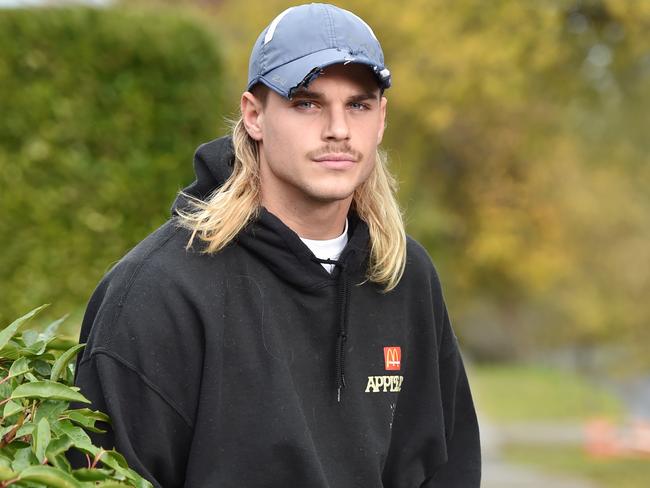
Ralphy: Why AFL’s illicit drugs policy is worth fighting for
—Jon Ralph
The AFL’s illicit drugs policy has been defined by its failures rather than the quiet successes that occur in a doctor’s office or a psychologist’s counselling session.
For the dozens of players who don’t take drugs in fear of exposure, or change their behaviour after a single drug strike, it only takes one screaming headline to undermine the policy’s ideals.
Luke Beveridge called on the AFL to scrap the policy altogether on Monday and on face value it is easy to see its weaknesses.
Watch every blockbuster AFL match this weekend Live & Ad-Break Free In-Play on Kayo. New to Kayo? Try 14-Days Free Now >
It didn’t help St Kilda’s Sam Fisher, whose recreational drugs use started at his club as he now sits in jail awaiting a potential 25 year jail sentence.
Or Jon Hay, Brock McLean and Ben Cousins, who admitted they flaunted the code as they battled their own mental health issues that saw them regularly taking drugs throughout their careers without fearing the drugs code.
Or even Smith himself, who was taking drugs in an off-season period not subjected to the illicit drugs policy but will be handed a strike because someone recorded him and posted it on social media.

And yet on the evidence from the AFL and player union those quiet successes are significant and at times life-changing.
The Herald Sun understands the AFL and player union have already agreed to an independent review by independent experts into the policy as part of a 2022 overhaul.
As the league told the Herald Sun: “An independent review is being conducted by independent experts, as a collaboration between the AFL and the AFLPA, to inform the development of the next iteration of the policy to ensure we are guided by best practice.”
This policy is worth fighting for, but there are tweaks and loopholes that can and should be closed to give the football public more confidence in its effectiveness.
Club doctors report that the threat of players taking illicit drugs that see them recording ASADA match-day positives is real.
So any policy that gets players out of the habit of taking AFL drugs is worthwhile _ even if that number is never quantifiable.
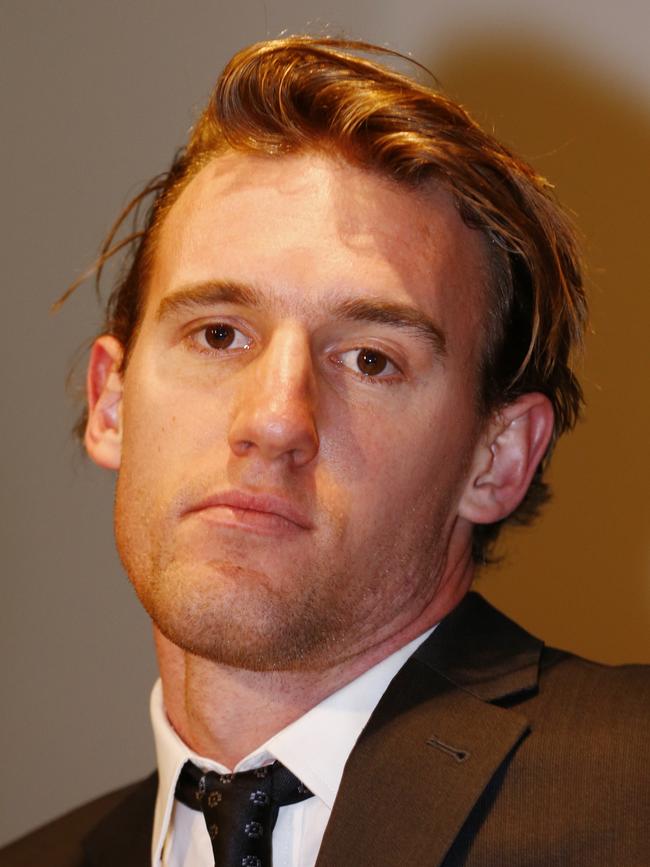
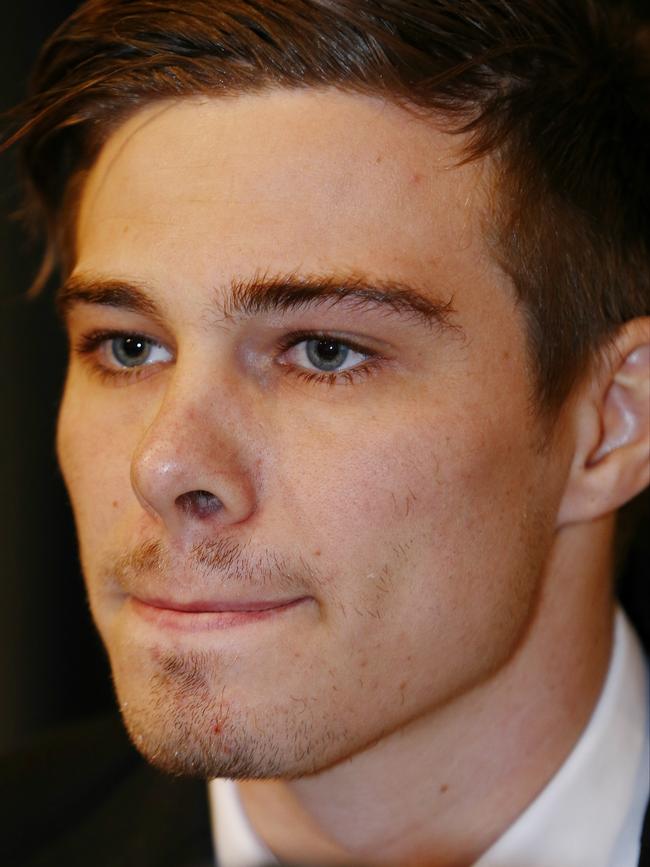
Talk to Lachie Keeffe and Josh Thomas, subjected to two-year bans when they took illicit drugs unwittingly laced with the banned WADA substance clenbuterol.
Or Willie Rioli, so desperate to avoid the presence of marijuana in his system that he tampered with an ASADA sample and endured a two-year ban.
Those players were caught in the WADA system and yet surely there would be so many more if the illicit drugs policy did not exist.
The clear issue is that players who have careers saved never have those stories made public.
As former AFL medical boss Peter Harcourt said in 2013, for the “bulk of the players we deal with it is just one-off, stupid, risk-taking behaviour”.
In other words, there are smart-arse players who take drugs, get the scare of their lives when they receive a strike and don’t do it again.
Then the other five per cent of drug positives are players with mental health issues who can be funnelled into education and care programs where otherwise they might have snowballed out of control.
As Ross Lyon told Triple M on Sunday: “We don’t need to know the names, but they should give us the numbers. Give us the visibility … the numbers (of players) that go in, are helped and don’t regress and come out the other side.
“We have one or two high profile players with public issues but there are 80 other players who are helped … the only way you can validate it is the success percentage.”
A policy shrouded in secrecy and totally lacking in transparency is always going to arouse suspicion.
The loopholes are significant and if used to their fullest extent mean players could accumulate multiple strikes across their career without ever facing suspension.
The first time a player self-reports drug use he doesn’t get a strike.
The drug strikes reset after four seasons.
No one has any idea how often players are tested across any given season.
Under the current policy we don’t know how many players took the chance to use the self-reporting loophole, admitting drug use and dodging a positive test.
We don’t know how many players were hair-tested across the summer, and if that targeted testing found drugs in a player’s system.
We don’t know if the medical model the AFL uses is a sham or a legitimate method to change the behaviours of those who might be about to turn into the next Sam Fisher.
Luke Beveridge suggested on Monday any player who had a diagnosed mental health condition was basically exempt from testing or recording positive strikes.
As the league revealed in 2016, a player battling mental health issues who has drug use that is related to those issues is recommended for treatment, counselling but also protection.
Positive drug tests during this full-blown rehab do not count as drug strikes, but there is a level of drug use that will see players withdrawn from competition temporarily.
So what is the trigger that sees some players allowed to continue on while taking drugs (but not recording a strike) and others forced to step aside?
The AFL is on record saying that it has “retired” at least three players because of persistent drug use but also been able to help many players because catching them using drugs then revealed their mental health issues.
The community wants to believe in a drug policy that doesn’t have so many loopholes and escape clauses.
The AFL community would be content if every single player was hair-tested across the off-season in a period when it is presumed that illicit drug use spikes.
Every one of those players who tested positive should be heavily target tested during the season.
Refining the policy and tightening its loopholes is the only answer, rather than abandoning it entirely.
Bevo calls for illicit drugs policy overhaul
—Chris Cavanagh
Western Bulldogs coach Luke Beveridge has called for an overhaul of the AFL’s illicit drugs policy in the wake of images and video surfacing showing star player Bailey Smith’s drug use late last year.
The Bulldogs have given their full support to Smith, who has confessed to “indulging in behaviours in late 2021 of which I am deeply ashamed”.
Smith was unsighted at Whitten Oval on Monday morning as teammates arrived for training following a bye for the club over the weekend.
The 21-year-old will be interviewed by the AFL Integrity Department on Tuesday as part of the league’s investigation into his behaviour.
Speaking to waiting media on his arrival to the club on Monday, Beveridge said the AFL’s illicit drug policy had little support from the clubs.
“None of us really feel it works,” he said.
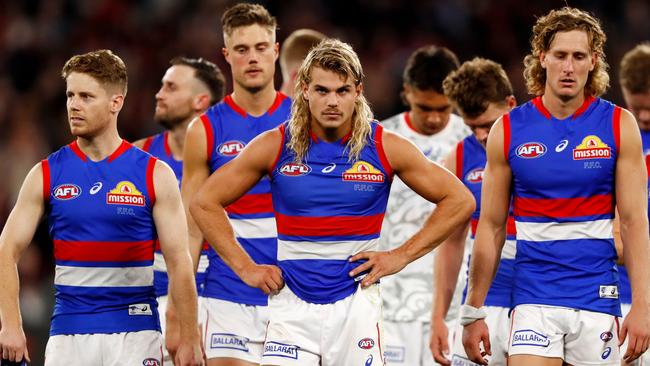
“Ultimately the clubs, the people – the constituents and the football clubs – are here to help and support our players.”
The AFL updated its Illicit Drugs Policy in late 2015, scrapping the public release of the results of illicit drug testing.
The three-strike policy sees players slapped with a $5000 suspended fine and compulsory counselling and education programs for a first detection.
However, only AFL medical directors and the player’s club doctor are told of a positive first test, with club management left in the dark.
A second detection can result in a four-match suspension and $5000 fine – with the player’s name made public – while a third detection can lead to a 12-match suspension and $10,000 fine.
No player has been suspended or publicly named as a result of positive tests since the revised policy was introduced.
Former Greater Western Sydney ruckman Shane Mumford accepted a two-match suspension in 2018 when video emerged of him allegedly taking illicit drugs.
Beveridge said he hoped that Smith would learn from the incident.
“We are here to help him and support him,” he said.
“None of us are forecasting the outcomes of the meeting with the AFL tomorrow. I would rather be silent on that. I would rather that we didn’t and just help Baz process this, deal with it and learn from it.”

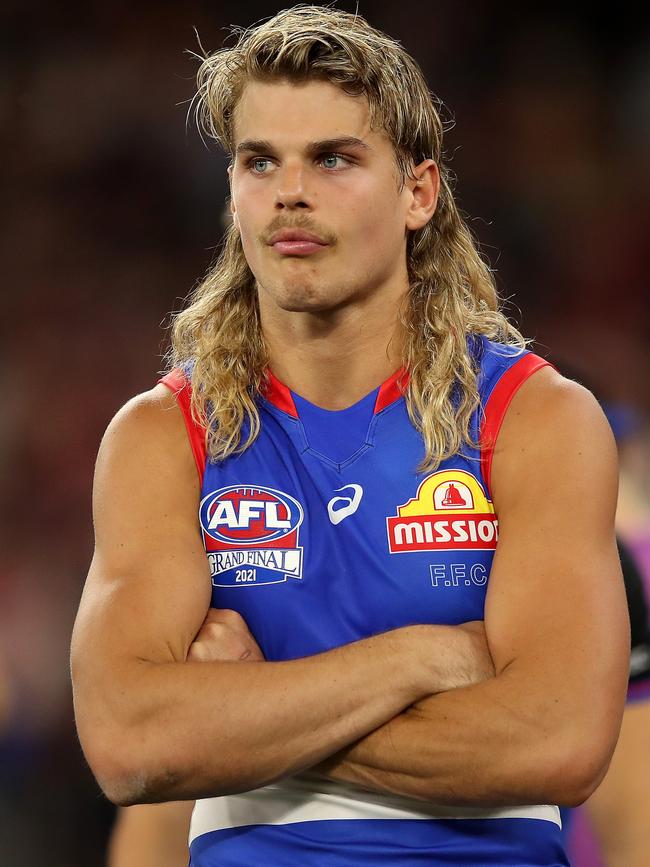
How will video drama impact Bailey Smith contract talks?
—Glenn McFarlane
One of footy’s most intriguing contract negotiations suddenly just got a lot more interesting.
The emergence on Saturday of a late-2021 video and photos of Western Bulldogs midfielder Bailey Smith with an illicit substance has added an extra layer to it.
Smith is in the final year of his current deal with the Bulldogs, and one of the most exciting young players in the game is still a fair way off from locking into a new contract.
The 21-year-old, who is one of the most marketable players in the competition, will front the AFL’s Integrity Unit in coming days to explain the context behind those images.
An AFL and Bulldogs investigation is underway and it could stretch into the next few weeks.
After Smith’s confession on Saturday he was “indulging in behaviours in late 2021 of which I am deeply ashamed”, he faces the prospect of a strike against his name under the AFL Illicit Drugs code.
He also potentially faces a one or two-match suspension.
How that will impact on the Bulldogs’ contract negotiations with Smith and his management about a lucrative new deal is yet to be determined.
If anything, it is likely to delay any talks in the short to medium term, even though the Bulldogs stressed on Saturday that they would offer Smith every support.

Smith’s contract value was already challenging long before the video and the photos started swamping social media channels early on Saturday.
Some player managers privately suggested Smith might be worth around $650,000 per season. But his outstanding recent form (he is averaging a career-high 31 disposals this year) and his marketing worth to the club has others insisting the final figure will more likely be around $800,000 per season.
Whatever the final figure, this indiscretion won’t help with his off-field appeal, though at least one major sponsor has backed the young star as he fights back from this controversy.
Smith acknowledged that in his statement, saying: “I know I have obligations beyond myself, not just contractually – but in terms of the example I set through the decisions I make, and I will be better.”
“I have made mistakes. I am very aware of that, and I fully own it.
“I unreservedly apologise to my family, my teammates, my club and its sponsors, the AFL, my supporters and my sponsors.”
His statement was contrite and didn’t skirt the issue, as many others have done in the past.
The Bulldogs understand Smith’s importance to the club because of his rare, explosive on-field talent mixed with his off-field marketing power that is almost unparalleled in the game.
His value to the club is already big and growing, with the Bulldogs’ sponsors constantly requesting Smith as part of their brand management.

Smith has been admirably open about his mental health challenges in recent seasons and conceded that he struggled to come to terms with the club’s grand final loss last year.
Those closest to him were concerned about his behaviour in the weeks after that game.
But the club was encouraged by the fact Smith chose to address his off-field issues late last year when he took time out due to mental health reasons last December.
Hawthorn premiership skipper Luke Hodge has urged the Bulldogs to closely monitor Smith’s welfare, while delicately balancing the need to ensure this behaviour doesn’t happen again.
Hodge said on SEN: “What the Doggies have to do is make sure this kid is OK because he is going to be rock bottom right now.”
The Bulldogs and those closest to him will close ranks around Smith as he deals with the fallout from this controversy.
But all have faith in his ability to bounce back from this setback.
More Coverage
Originally published as AFL 2022: Luke Beveridge expects Bailey Smith to return to club in prime condition despite drama




